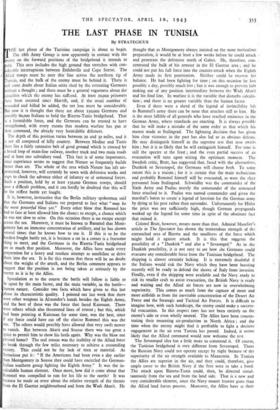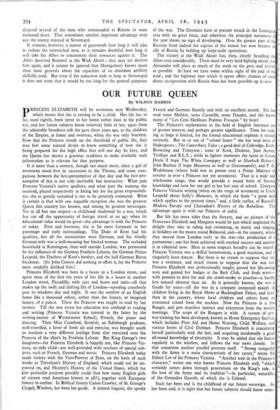THE LAST PHASE IN TUNISIA
By STRATEGICUS HE last phase of the Tunisian campaign is about to begin.
The ISth Army Group is now apparently in contact with the nemv on the forward positions of the bridgehead it intends to old. This area includes the high ground that stretches with con- iderable interruptions between Enfidaville and Cape Serrat. The Allied troops must be near this line across the northern tip of
unisia, and the bulk of the enemy must be behind it. There is till some doubt about Italian units shed by the retreating 'Germans vithout a thought ; and there must be a general vagueness about the asualties which the enemy has suffered. At least 20,000 prisoners have been counted since. Mareth, and, if the usual number of wounded and killed be added, the net loss must be considerable. But now it is thought that there are about Iso,000 Germans and possibly 6o,000 Italians to hold the Bizerta-Tunis bridgehead. That is a formidable force, and the Germans can be trusted to have strengthened, with every means that modern warfare has put at their command, the already very formidable defences.
The depth of this position varies between 20 and 3o miles, and it is not all composed of hilly country. Between Medjaz and Tunis there lies a fairly extensive belt of good ground which is crossed by a broad loop of main-line railway, another track and two main roads and at least one subsidiary road. This fact is of some importance, since experience seems to suggest that Nature so frequently builds better than art. The whole of the area which Nature has left un- protected, however, will certainly be sown with defensive works and traps to check the advance either of infantry or of armoured forces. Such a position, held by at least 15o,000 German troops, should ose a difficult problem, and it can hardly be doubted that this will e the stiffest battle yet fought.
It is, however, instructive that the Berlin military spokesman said hat the Germans and Italians are prepared to face what "may be he most powerful blow yet." Every other blow that Rommel has ad to face at least allowed him the chance to escape, a chance which e was not slow to seize. On this occasion there is no escape except cross the sea. Moreover, it must be known to Rommel that Mont- :omery hai an immense concentration of artillery, and he has shown several times that he knows how to use it. If this is to be the ardest fought battle yet, it is because a rat in a corner is a fearsome thing to meet, and the Germans in the Bizerta-Tunis bridgehead are in much that position. Moreover, the Allies have made every preparation for a heavy and resolute attempt to annihilate or drive them into the sea. It is for this reason that there will be no doubt about the weight of the attack, and the Berlin comment appears to suggest that the position is not being taken as seriously by the enemy as it is by the Allies.
Speculation as to the course the battle will follow is liable to be upset by the main factor, and the main variable, in the battle— human nature. Consider two facts which have given to this last phase its characteristic quality. I pointed out last week that there were other weapons in Alexander's hands besides the Eighth Army, and the best of these was the force that faced Kairouan. There were others which also threatened lines of retreat ; but this, which had been pointing at Kairouan for some time, was the best, since if any force could have cut off the elusive Rommel this was the one. The others would possibly have allowed that very swift mover to vanish. But between Akarit and Sousse there was too great a space to permit him to show his heels again. Why was the blow not presed home? The real reason was the inability of the Allied force to break through the few miles necessary to achieve a resounding victory. This could not be for lack of men or material. As Sertorious put it: " If the Americans had been even a day earlier than Montgomery in Sousse they could have encircled the German- Italian southern group fighting the Eighth Army." It was the in- calculable human element. Once more, how did it come about that Rommel was compelled to run for his life to the north? It was because he made an error about the relative strength of the threats from the El Guettar.neighbourhood and from the Wadi Akarit. He thought that as Montgomery always insisted on the most meticulous preparation, it would be at least a few weeks before he could attack and penetrate the defensive north of Gabes. He, therefore, con- centrated the bulk of his armour in the El Guettar area ; and he could not put his full force into the counter-attack when the Eighth Army made its first penetration. Neither could he recover his balance. He had been fighting for time ; on this occasion he lost possibly a day, possibly much less ; but it was enough to prevent him making use of any position intermediate between the Wadi Akarit and his final line. In warfare it is the variable that disturbs calcula- tion ; and there is no greater variable than the human factor.
Even if there were a shred of the legend of invincibility left to Rommel's army there can be none that attaches still to him. He is the most fallible of all generals who have reached eminence in the German Army, where standards are exacting. It is always possible that he will make a mistake of the same order as that which his master made at Stalingrad. The lightning decision that has given him clear victories in the past has also led to as obvious defeats. He may distinguish himself in the supreme test that now awaits him ; but it is as likely that he will extinguish himself. For time is still the spectre at the feast ; and the even partial success of an evacuation will turn upon seizing the optimum moment. The Swedish critic, Bratt, has suggested that, faced with the alternatives, Dunkirk or Sevastopol, the Germans will choose both. To some extent this is a truism ; for it is certain that the main technicians and probably Rommel himself will be evacuated, as were the elect personnel from Stalingrad. Schwiidler was the commander of the Sixth Army and Paulus merely the commander of the armoured force attached to it. Paulus was named commander and given the marshal's baton to create'a legend of heroism for the German army by dying at his post rather than surrender. Unfortunately for Hitler the price was not sufficiently high, though German propaganda worked up the legend for some time in spite of the obstinate tact that ruined it.
Colonel Bran, however, means more than that. Admiral Muselicr's article in The Spectator has shown the tremendous strength of the entrenched area of Bizerta and the smallness of the force which might hold it against attack. It is this that suggests the possibility of a " Dunkirk " and also a " Sevastopol." As to the Dunkirk possibility, it is not easy to see how the Germans could evacuate any considerable force from the Tunisian bridgehead. The shipping is almost certainly lacking. It is extremely doubtful if the Italians would risk the Navy which they have been boasting recently will be ready to defend the shores of Italy from invasion. Finally, even if the shipping were available and the Navy ready to risk its smaller craft to assist evacuation, the British Navy is ready and waiting and the Allied air forces are now in overwhelming superiority. This comes as much from the capture of more and more airfields as from the inevitable concentration of the Desert Air Force and the Strategic and Tactical Air Forces. It is difficult to imagine how, with such handicaps, the enemy could make a success- ful evacuation. In this respect time has not been entirely on the enemy's side or even wholly neutral. The Allies have been concen- trating their mounting air-production in North Africa ; and the time when the enemy might find it profitable to fight a decisive engagement in the air over Tunisia has passed. Indeed, it seems likely that the Allied command would now welcome the test.
The Sevastopol idea has a little more to commend it. Of course, the Tunisian bridgehead is very different from Sevastopol. There the Russian Navy could not operate except by night because of the superiority of the air strength available to Mannstein. In Tunisia the Allies are superior in the air, and they could, therefore, give ample cover to the British Navy if the fleet were to take a hand. The attack upon Bizerta-Tunis could, then, be directed simul- taneously from the sea and from the land side. That is a new and very considerable element, since the Navy mount heavier guns than the Allied land forces possess. Moreover, the Allies have at their disposal several of the men who commanded at Bizerta or were stationed there. That constitutes another important advantage over any the enemy enjoyed at Sevastopol.
It remains, however, a matter of guesswork how long it will take to reduce the entrenched area, as it remains doubtful how long it will take the Allies to concentrate their resources against it. The Allies deceived Rommel at the Wadi Akarit ; they may yet deceive him again, and it cannot be ignored that Montgomery knows more than most generals about the capacities of an abundant artillery skilfully used. But even if the reduction took as long as Sevastopol it does not seem that it would be too long for the general purposes of the war. The Germans have at present struck in the Leningrad area with no great force, and otherwise the principal movement of the year'shows no sign of developing. Over the greater part of the Russian front indeed the caprice of the season has now become an ally of Russia by holding up large-scale operations.
The victory at the Wadi Akarit has, then, clearly benefited the Allies very considerably. There must be very bard fighting ahead ; but Alexander will place as much of the work on the guns and aircraft as possible. At least we have come within sight of the ,end of the road ; and the highway into which it opens offers chances of more direct co-operation with Russia than has been possible up to now.



























 Previous page
Previous page